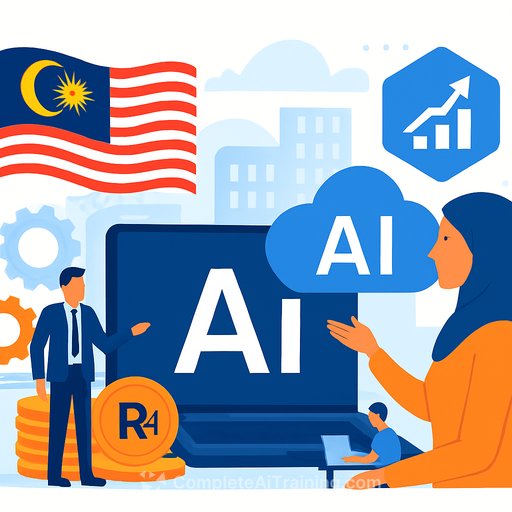Budget 2026 Signals Real AI Momentum In Malaysia - Here's What IT and Dev Teams Should Do Next
Malaysia is moving on a clear path to achieve AI Nation status by 2030. Budget 2026 allocates nearly RM5.9 billion to research, development, commercialisation and innovation, with a focus on practical AI deployment and data sovereignty via a Sovereign AI Cloud.
Experts agree the direction is strong. The outcome now hinges on execution, governance and closing the adoption gap between large enterprises and MSMEs.
What's New In Budget 2026 (AI-Focused Highlights)
- RM5.9 billion for RDCI: Funding spread across ministries to drive AI research, development and innovation with measurable outcomes.
- MSME training incentive: Additional 50% tax deduction for AI and cybersecurity training to widen adoption and build grassroots capability.
- Sovereign AI Cloud + AI Transformation Centre: Led by the Malaysian Communications and Multimedia Commission (MCMC) to strengthen data sovereignty and accelerate implementation.
- Whole-of-ecosystem coordination: Call for effective collaboration across MIMOS (tech), NAIO (policy), MRANTI (commercialisation) and universities (research), avoiding overlap and turf wars.
- AI safety and rights: Push to consider laws prohibiting unauthorised use of personal images/videos for AI-generated content.
Expert Signals You Should Heed
"Good governance is crucial. If implementation is effective, Malaysia can hit the 2030 target."
"Big companies may benefit quickly, while smaller enterprises risk being left behind. Close this gap to ensure inclusive development."
"Substantial research funds are allocated every year. Ensure optimal use that creates tangible impact."
Impact For Engineering, Data, And Product Teams
- Treat governance as a feature: Define model risk classes, approval workflows, audit trails and incident response. Start lightweight; iterate.
- Build for data sovereignty: Map data residency, PII handling and model placement. Align to Sovereign AI Cloud options for sensitive workloads.
- Skilling at speed: Use the MSME tax deduction to upskill in prompt engineering, RAG, MLOps, secure model integration and AI safety.
- Prove value early: Prioritise 90-day pilots with clear ROI metrics (cost-to-serve, cycle time, defect rate, CSAT). Kill what doesn't move the needle.
- Standardise MLOps: Establish feature stores, evaluation baselines, lineage, testing for prompt + model updates and red-teaming protocols.
- Secure the stack: Add threat models for prompt injection, data exfiltration and model abuse. Log inputs/outputs with privacy controls.
- Bridge the MSME gap: Package turn-key patterns (playbooks, templates, pretrained components) that smaller teams can deploy with minimal infra.
- Integrate with agencies: Coordinate with MIMOS/MRANTI/NAIO programs to access infrastructure, grants and commercialization pathways.
Implementation Checklist (Next 12 Months)
- 0-60 days: Inventory AI use cases, classify data sensitivity, select 2-3 pilot projects, define governance guardrails and choose deployment targets (public cloud vs Sovereign AI Cloud).
- 60-120 days: Stand up MLOps baseline (CI/CD for models/prompts, eval harness, observability), finalize training plans using tax incentives, and publish an AI policy summary for stakeholders.
- 6-12 months: Move pilots to production with SLAs, expand to 5-10 high-value use cases, implement continuous evaluation and bias testing, and report ROI to secure sustained funding.
Where Coordination Matters
MIMOS brings technology development, NAIO leads policy, MRANTI drives commercialization and universities deliver research and talent. These strengths should complement one another through shared roadmaps, common metrics and clear ownership to avoid duplication and delays.
MSME Enablement: Make It Practical
- Offer prebuilt workflows (customer support, lead scoring, invoice processing, code assist) that deploy in days, not months.
- Bundle training with hands-on templates and sandbox environments so teams can learn on live business problems.
- Track adoption with simple KPIs: time saved per task, error rate reduction, and incremental revenue per workflow.
AI Safety And Trust
Expect stronger rules on AI-generated content and identity misuse. Prepare watermarking where feasible, content provenance checks and consent-driven data collection. Bake these controls into your product requirements now to avoid rework later.
Training And Skills
If you're planning to leverage the MSME training deduction, map courses to immediate project needs and role-specific outcomes. Prioritise practical skills that shorten time-to-value and reduce operational risk.
- Explore role-based learning paths here: Complete AI Training - Courses by Job
Bottom Line
The funding is substantial, infrastructure is coming online and incentives are in place. The advantage goes to teams that execute with clear governance, measurable outcomes and a practical plan for SME inclusion.
Your membership also unlocks:






